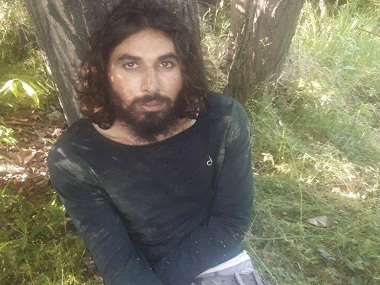It is a shame that rifleman Aurangzeb was
abducted, tortured and killed while on his way home from his army camp last Thursday. His murder indicates that no steps have been taken to secure soldiers from the state of Jammu and Kashmir when they are on leave, even as terror attacks continue to worsen relentlessly. [caption id=“attachment_4522661” align=“alignleft” width=“380”] File image of Rifleman Aurangzeb. News18.[/caption] This is particularly troubling as it happened more than a year after
Lieutenant Umar Fayaz was killed in a similar way , while in Kashmir on leave from the army. The wave of empathy, remorse, and anger that swept the country after the young officer’s murder does not seem to have led to operational differences. In an age of amazing and all-encompassing electronic surveillance and security systems, it is disappointing that alarms, tracking apparatus, and quick-response rescue mechanisms have not been set up for soldiers on leave. Message for help
Aurangzeb's father said in an interview that he had heard his son over the telephone yelling “stop the car” for 10 minutes. Perhaps the abducted soldier had covertly dialed the last dialed number on his mobile phone so his father could hear that he was being abducted. Had there been an easy facility to send an alarm to his unit or a centralised monitoring unit, it would have surely been possible to track the location of his phone and initiate a rescue mission. That such procedures have not been put in place yet suggests a cynical disregard for the lives of soldiers from Jammu and Kashmir, who are bound to be more and more intensely targeted as the situation continues to worsen. As things stand, there is little doubt that violence will spiral, probably to unprecedented highs. Those in charge of security policy should realise that soldiers and other security personnel from the state will be even more urgently required as the situation worsens. Quite apart from such tactical thinking, soldiers should be able to count on a caring and responsive leadership, both in the army brass and the political establishment. Those in decision-making roles should have become keenly conscious of the need for alarm and rescue systems after Lieutenant Fayaz was abducted and brutally killed last year. Rifleman Aurangzeb’s death should now be more than enough reason to ensure that soldiers on leave are monitored. Propaganda hype The irony is that those in charge of government and army propaganda, as well as their bosses in very high places, tend to highlight the fact that youth from Jammu and Kashmir turn up in large numbers to be recruited in the Indian Army and other security forces. Ironically, some of those who focus on this also tend to highlight that Jammu and Kashmir is an integral part of India and that there is no difference between citizens from this and other parts of the country. The army had launched a major recruitment drive during the prolonged agitations that followed the
killing of militant commander Burhan Wani in July 2016. The purpose of this drive was to show that local youth are happy to work for the army. [caption id=“attachment_4425575” align=“alignright” width=“380”]
Representational image. AP[/caption] A large number of Kashmiri youth did indeed turn up for the recruitment tests at two locations in the Valley. However, once young people from the state join the forces, they must not be treated as propaganda tools or cannon fodder. Every effort must be made to secure them. Some sections of the media try to project such soldiers as the “real” face of Kashmir. Even on Saturday,
when rifleman Aurangzeb was buried , a news channel repeatedly posed a question about whether stone-pelting or Aurangzeb was the real face of Kashmir. Not only is this false categorisation, this notion tends to divide the state into geographical and sociological lines, which could prove very costly for national security. One of the many proud traditions of the Indian Army is that it does not differentiate between officers and men from different parts of the country. Equal treatment of all religions, too, has been a proud and laudable army tradition.
Indian Army soldiers from Jammu and Kashmir are bound to be more intensely targeted as the security situation in the state continues to worsen.
David Devadas is an expert on politics and geopolitics. Formerly a Senior Fellow at the Nehru Memorial Museum and Library, Visiting Professor at Jamia Millia Islamia, and Political Editor of Business Standard, he is currently Distinguished Fellow at the Institute for Social Sciences. He has written books on Kashmir, on youth, and on history. He has been a radio compere, guest faculty at JNU's Academic Staff College, St Stephen's College and Hindu College. He has worked for the Indian Express, The Hindustan Times, India Today, The Economic Times and Gulf News. His most impactful article, on a murder cover-up, prevented a Congress President from becoming prime minister. One led to the closure of an airline, and another created a furore and consequent clean-up in Delhi's health department. Several have correctly predicted election results in key states, and a series of reports from Srinagar made the government aware of how unsettled the situation there was in 1990. He is an alumnus of St Xavier's School, St Stephen's College, and the Indian Institute of Mass Communication. He has lived for extended periods in Geneva and Berlin, and has traveled to almost 50 countries. He enjoys various kinds of music, theatre, design, architecture and art. see more


)

)
)
)
)
)
)
)
)



